|
|
|
Sort Order |
|
|
|
Items / Page
|
|
|
|
|
|
|
| Srl | Item |
| 1 |
ID:
107064
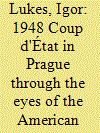

|
|
|
|
|
| Publication |
2011.
|
| Summary/Abstract |
This article examines the dramatic events that transformed Czechoslovakia into a totalitarian dictatorship primarily from the perspective of the United States Foreign Service officers posted at the American Embassy in Prague. It is based on new archival sources, on interviews with former American Foreign Service and Intelligence officers, and on their unpublished mémoires.
|
|
|
|
|
|
|
|
|
|
|
|
|
|
|
|
| 2 |
ID:
024530
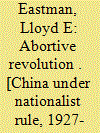

|
|
|
|
|
| Publication |
Cambridge, Harvard University Press, 1974.
|
| Description |
xvii, 398p.hbk
|
| Standard Number |
674001753
|
|
|
|
|
|
|
|
|
|
|
|
Copies: C:1/I:0,R:0,Q:0
Circulation
| Accession# | Call# | Current Location | Status | Policy | Location |
| 014655 | 951.042/EAS 014655 | Main | On Shelf | General | |
|
|
|
|
| 3 |
ID:
085193
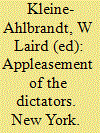

|
|
|
|
|
| Publication |
New York, Holt, Rinehart and Winston, 1970.
|
| Description |
138p.
|
| Standard Number |
0030781450
|
|
|
|
|
|
|
|
|
|
|
|
Copies: C:1/I:0,R:0,Q:0
Circulation
| Accession# | Call# | Current Location | Status | Policy | Location |
| 004577 | 321.9/APP 004577 | Main | On Shelf | General | |
|
|
|
|
| 4 |
ID:
132412
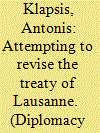

|
|
|
|
|
| Publication |
2014.
|
| Summary/Abstract |
In June 1925, General Theodoros Pangalos imposed his dictatorship on Greece. During his 14-month rule, he set as one of his basic foreign policy goals the revision of the territorial settlement imposed on Greece and Turkey by the 1923 Treaty of Lausanne. Wanting to secure Eastern Thrace and possibly even part of Western Asia Minor for Greece, Pangalos sought the backing of at least one Great Power with interests in the region, in this case Italy, as its dictator, Benito Mussolini, remained equally hostile and aggressive toward Turkey. Pangalos tried to reach an understanding with Mussolini concerning the possibility of joint Greco-Italian action against Turkey. The first signs of closer co-operation came in early July 1925 when the Italian under-secretary of foreign affairs, Dino Grandi, visited Athens for discussions with Pangalos. However, a more important initiative involved the official visit of two Greek ministers-Loukas Kanakaris-Roufos, the foreign minister, and Anastasios Tavoularis, the transport minister-to Rome in early March 1926. They met with Mussolini who, because of British pressure, now seemed reluctant about Pangalos' ambitious plans for joint action against Turkey. The Greek leader's hopes to revise Lausanne ended.
|
|
|
|
|
|
|
|
|
|
|
|
|
|
|
|
| 5 |
ID:
146468
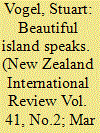

|
|
|
| 6 |
ID:
082032
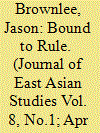

|
|
|
|
|
| Publication |
2008.
|
| Summary/Abstract |
This article revisits the electoral emphasis of hybrid regime studies, arguing instead that the impact of elections is structured by variations in prior political institutions, particularly the dismantlement or maintenance of a ruling party. Duration tests on 136 regimes indicate that ruling parties reduce the chance of regime collapse, while "electoral autocracy" has no significant effect. A paired comparison of Malaysia and the Philippines then shows how variations in party institutions propelled divergent courses of authoritarian dominance and democratization. During the late 1980s and 1990s, Malaysia's ruling party (UMNO) bound together otherwise fractious leaders, twice deflecting potent electoral challenges. By contrast, when Ferdinand Marcos abandoned the Nacionalista Party after 1972, he fueled the movement that would subsequently oust him. The efficacy of opposition parties Semangat '46 and United Nationalist Democratic Opposition (UNIDO) was thus heavily imbricated with the institutions of the regimes they challenged and less contingent on short-term electoral politics.
|
|
|
|
|
|
|
|
|
|
|
|
|
|
|
|
| 7 |
ID:
080168
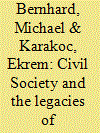

|
|
|
|
|
| Publication |
2007.
|
| Summary/Abstract |
The literature on civil society in postcommunist regimes highlights its weakness as compared with civil society in other democracies. In this article the authors make a general argument on how different patterns of antecedent dictatorship affect the development of civil society across a range of democracies. They examine the slow emergence of two behaviors associated with a robust civil society-participation in organizational life and in protest-and explain variation across countries as a function of regime history. They draw their individual-level data from the World Values Survey and analyze the behavior of over forty-one thousand citizens from forty-two democracies. Using methods of hierarchical linear modeling to control for both national-level and individual-level factors, the authors find that different types of dictatorship and variation in their duration produce different negative legacies for the development of civil society
|
|
|
|
|
|
|
|
|
|
|
|
|
|
|
|
| 8 |
ID:
117047
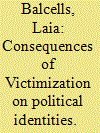

|
|
|
|
|
| Publication |
2012.
|
| Summary/Abstract |
This article explores the impact of war-related traumatic experiences on political identities and political behavior by exploring different pieces of empirical evidence from the Spanish Civil War (1936-39), the Franco dictatorship (1939-75), and its aftermath. On one hand, the author analyzes semistructured interviews of survivors of the civil war and the dictatorship; on the other hand, she assesses data from a specialized survey implemented on a representative sample of the Spanish population. The analyses broadly suggest that, controlling for family leanings during the civil war, victimization experiences during the civil war and the subsequent dictatorship lead to the rejection of the perpetrators' identities along the political cleavage that was salient during the war (i.e., left-right). The survey analysis also indicates that (1) although grudges related to severe wartime violations are transmitted through generations, moderate wartime violations do not have such a long-term political impact; (2) the political effects of victimization do not increase with proximity to the traumatic events (i.e., age); and (3) victimization experiences do not have a significant impact on identities along cleavages that were not salient during the war (i.e., center-periphery).
|
|
|
|
|
|
|
|
|
|
|
|
|
|
|
|
| 9 |
ID:
134098
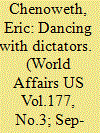

|
|
|
|
|
| Publication |
2014.
|
| Summary/Abstract |
Twenty-five years ago, breakthrough elections were held in Poland that led, within three months, to the downfall of that country's communist regime. The events helped to spark the Velvet Revolutions that spread, within the next six months, to Budapest, Prague, Bratislava, Berlin, Sofia, Timisoara, and many other major cities, as masses of people went to the streets to demand their rights, oppose Soviet occupation, and win back their freedom. Communist despotisms that had lasted more than four decades collapsed like a house of cards. The world celebrated the fall of communism and the victory of democracy.
|
|
|
|
|
|
|
|
|
|
|
|
|
|
|
|
| 10 |
ID:
187552
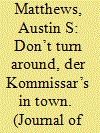

|
|
|
|
|
| Summary/Abstract |
How do dictators coup-proof their armed forces from within the barracks? Coup-proofing is an important aspect of autocratic survival, but execution can be challenging due to the secrecy of plots and the vast size of the armed forces. Counterbalanced state security forces are more effective at resisting coups, but less effective at noticing signs of plots before they can be launched. If dictators wish to prevent coup attempts from occurring in the first place, they may decide to recruit and commission cadres of loyalists directly into the armed forces as political officers, tasked with monitoring for and reporting signs of disloyalty within the ranks. This article explores the development and use of these political officers within dictatorships, arguing that they are especially effective at preventing coup attempts. It also makes the case that their institutional design, while effective at detecting coup plots, makes them less useful at resisting coups that have reached the execution phase. I test these arguments on a cross-national sample of dictatorships from 1950 to 2010, finding strong evidence that political officers are incredibly effective coup detectors, but not coup resisters. These findings have important implications, particularly as several resilient modern dictatorships continue to rule with well-developed political officer systems.
|
|
|
|
|
|
|
|
|
|
|
|
|
|
|
|
| 11 |
ID:
120122


|
|
|
|
|
| Publication |
2013.
|
| Summary/Abstract |
What determines the emergence and survival of democracy? The authors apply extreme bounds analysis to test the robustness of fifty-nine factors proposed in the literature, evaluating over three million regressions with data from 165 countries from 1976 to 2002. The most robust determinants of the transition to democracy are gross domestic product (GDP) growth (a negative effect), past transitions (a positive effect), and Organisation for Economic Co-operation and Development membership (a positive effect). There is some evidence that fuel exporters and Muslim countries are less likely to see democracy emerge, although the latter finding is driven entirely by oil-producing Muslim countries. Regarding the survival of democracy, the most robust determinants are GDP per capita (a positive effect) and past transitions (a negative effect). There is some evidence that having a former military leader as the chief executive has a negative effect, while having other democracies as neighbors has a reinforcing effect.
|
|
|
|
|
|
|
|
|
|
|
|
|
|
|
|
| 12 |
ID:
122592
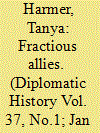

|
|
|
|
|
| Publication |
2013.
|
| Summary/Abstract |
The Nixon and Ford administrations celebrated the 1973 Chilean coup and did everything they could to help the dictatorship that followed. Secretary of State Henry Kissinger, in particular, supported General Augusto Pinochet's regime and turned a blind eye to its human rights abuses. But how did the Chilean dictatorship view the United States and how did the relationship play out in practice? Drawing on Chilean and U.S. documents, this article argues that in spite of Kissinger's efforts, bilateral relations were actually rather tense. Not only did the Chilean dictatorship continually request more than the Ford administration could offer but Santiago's military leaders also had different conceptions of the Cold War and how to fight it. This, in turn, sheds light on the problems U.S. policy makers faced when dealing with anti-communist Third World allies. It also points to the fragmentation of the global Cold War struggle in the mid-1970s.
|
|
|
|
|
|
|
|
|
|
|
|
|
|
|
|
| 13 |
ID:
067083


|
|
|
|
|
| Publication |
Hampshire, Palgrave Macmillan, 2004.
|
| Description |
ix, 278p.pbk
|
| Standard Number |
1403971447
|
|
|
|
|
|
|
|
|
|
|
|
Copies: C:1/I:0,R:0,Q:0
Circulation
| Accession# | Call# | Current Location | Status | Policy | Location |
| 050446 | 956.70443/AND 050446 | Main | On Shelf | General | |
|
|
|
|
| 14 |
ID:
116830
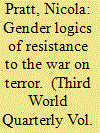

|
|
|
|
|
| Publication |
2012.
|
| Summary/Abstract |
This article asks, 'How are femininities constructed in resisting the "war on terror" and with what implications for women's agency and the conceptualisation of gender?' It examines the under-studied gender logics of non-violent resistance to the 'war on terror' by focusing on a series of conferences held in Cairo, between 2002 and 2008, uniting opposition to imperialism, Zionism, neoliberalism and dictatorship. Whereas much feminist scholarship conceptualises sex-gender difference within patriarchy as the major source of women's subordination, women speakers at the Cairo conferences erased patriarchy as a source of subordination and valorised sex-gender difference as a source of agency in resisting the 'war on terror'. Femininities were constructed against the dominant narratives and practices of the war on terror through the representation of national/religious or class differences. These 'resistance femininities' represent strategically essentialised identities that function to bridge differences and mobilise women against the 'war on terror'.
|
|
|
|
|
|
|
|
|
|
|
|
|
|
|
|
| 15 |
ID:
090253
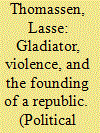

|
|
|
|
|
| Publication |
2009.
|
| Summary/Abstract |
Ridley Scott's 2000 film Gladiator presents a view of the transition from dictatorship to the republic that one also finds in the discourses of certain political leaders today. I argue that we can learn about violence and the founding of a republic from an analysis and, especially, a critique of Gladiator.
|
|
|
|
|
|
|
|
|
|
|
|
|
|
|
|
| 16 |
ID:
030524
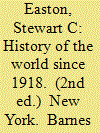

|
|
|
|
|
| Edition |
2nd ed.
|
| Publication |
New York, Barnes and Noble, Inc., 1971.
|
| Description |
viii, 438p.Pbk
|
| Series |
College outline series
|
| Standard Number |
389001376
|
|
|
|
|
|
|
|
|
|
|
|
Copies: C:1/I:0,R:0,Q:0
Circulation
| Accession# | Call# | Current Location | Status | Policy | Location |
| 010931 | 909.82/EAS 010931 | Main | On Shelf | General | |
|
|
|
|
| 17 |
ID:
027842
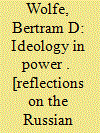

|
|
|
|
|
| Publication |
London, George Allen and Unwin Ltd., 1969.
|
| Description |
viii, 406p.hbk
|
| Standard Number |
043350270
|
|
|
|
|
|
|
|
|
|
|
|
Copies: C:1/I:0,R:0,Q:0
Circulation
| Accession# | Call# | Current Location | Status | Policy | Location |
| 005938 | 947.0841/WOL 005938 | Main | On Shelf | General | |
|
|
|
|
| 18 |
ID:
034853
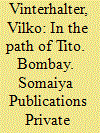

|
|
|
|
|
| Publication |
Bombay, Somaiya Publications Private Limited, 1972.
|
| Description |
xi, 516p.Hbk
|
|
|
|
|
|
|
|
|
|
|
|
Copies: C:1/I:0,R:0,Q:0
Circulation
| Accession# | Call# | Current Location | Status | Policy | Location |
| 010479 | 923.1497/VIN 010479 | Main | On Shelf | General | |
|
|
|
|
| 19 |
ID:
091119
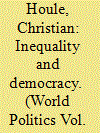

|
|
|
|
|
| Publication |
2009.
|
| Summary/Abstract |
Under what conditions do democracies emerge and consolidate? Recent theories suggest that inequality is among the leading determinants of both democratization and consolidation. By contrast, this article argues that inequality harms consolidation but has no net effect on democratization. The author shows that the existing theories that link inequality to democratization suffer from serious limitations: (1) they are useful only for understanding transitions from below and thus do not apply to many other transitions (that is, those from above); (2) even for democratization from below, their predictions are unlikely to hold, since inequality actually has two opposite effects; and (3) they ignore collective action problems, which reduces their explanatory power. However, these objections do not affect the relationship between inequality and consolidation. In particular, while inequality has two opposite effects on the probability of transition to democracy, it unambiguously increases the probability of transition away from democracy. This article conducts the most comprehensive empirical test to date of the relationship between inequality and democracy. It finds no support for the main democratization theories. Contrary to what they predict, estimation suggests neither a monotonic negative nor an inverted U-shaped relationship. Yet inequality increases the probability of backsliding from democracy to dictatorship.
|
|
|
|
|
|
|
|
|
|
|
|
|
|
|
|
| 20 |
ID:
119421


|
|
|
|
|
| Publication |
2013.
|
| Summary/Abstract |
The wave of protests that began in December 2010 and swept the Arab world ended dozens of years of regime stability in the Middle East. The spontaneous outpouring of the masses into the streets in protest of numerous years of dictatorship, tyranny, and corruption, for instance, in Egypt, took by surprise even those who allegedly understand the Egyptian street: journalists and academic experts active in this field; Western intelligence services, particularly in the United States and Israel, two countries that perceived Egyptian president Hosni Mubarak as an essential ally and an island of stability; and even among the Egyptian security and intelligence services, which, as in other dictatorial regimes, had invested considerable efforts into the regime's preservation.
|
|
|
|
|
|
|
|
|
|
|
|
|
|
|
|
|
|
|
|
|